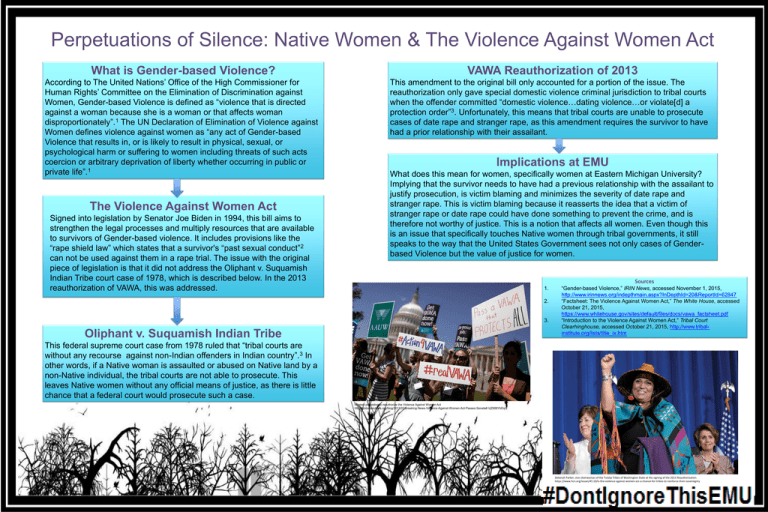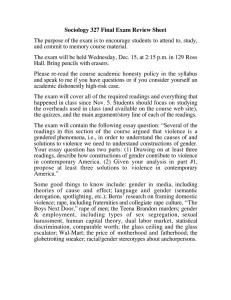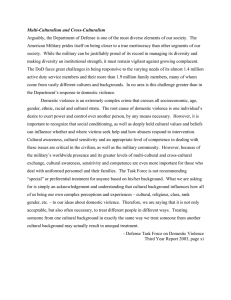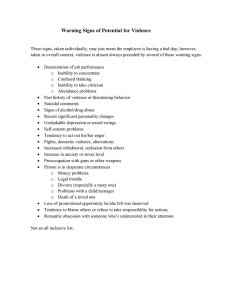
Perpetuations of Silence: Native Women & The Violence Against Women Act
What is Gender-based Violence?
According to The United Nations’ Office of the High Commissioner for
Human Rights’ Committee on the Elimination of Discrimination against
Women, Gender-based Violence is defined as “violence that is directed
against a woman because she is a woman or that affects woman
disproportionately”.1 The UN Declaration of Elimination of Violence against
Women defines violence against women as “any act of Gender-based
Violence that results in, or is likely to result in physical, sexual, or
psychological harm or suffering to women including threats of such acts
coercion or arbitrary deprivation of liberty whether occurring in public or
private life”.1
The Violence Against Women Act
Signed into legislation by Senator Joe Biden in 1994, this bill aims to
strengthen the legal processes and multiply resources that are available
to survivors of Gender-based violence. It includes provisions like the
“rape shield law” which states that a survivor's “past sexual conduct”2
can not be used against them in a rape trial. The issue with the original
piece of legislation is that it did not address the Oliphant v. Suquamish
Indian Tribe court case of 1978, which is described below. In the 2013
reauthorization of VAWA, this was addressed.
VAWA Reauthorization of 2013
This amendment to the original bill only accounted for a portion of the issue. The
reauthorization only gave special domestic violence criminal jurisdiction to tribal courts
when the offender committed “domestic violence…dating violence…or violate[d] a
protection order”3. Unfortunately, this means that tribal courts are unable to prosecute
cases of date rape and stranger rape, as this amendment requires the survivor to have
had a prior relationship with their assailant.
Implications at EMU
What does this mean for women, specifically women at Eastern Michigan University?
Implying that the survivor needs to have had a previous relationship with the assailant to
justify prosecution, is victim blaming and minimizes the severity of date rape and
stranger rape. This is victim blaming because it reasserts the idea that a victim of
stranger rape or date rape could have done something to prevent the crime, and is
therefore not worthy of justice. This is a notion that affects all women. Even though this
is an issue that specifically touches Native women through tribal governments, it still
speaks to the way that the United States Government sees not only cases of Genderbased Violence but the value of justice for women.
Sources
1.
2.
3.
Oliphant v. Suquamish Indian Tribe
“Gender-based Violence,” IRIN News, accessed November 1, 2015,
http://www.irinnews.org/indepthmain.aspx?InDepthId=20&ReportId=62847
“Factsheet: The Violence Against Women Act,” The White House, accessed
October 21, 2015,
https://www.whitehouse.gov/sites/default/files/docs/vawa_factsheet.pdf
“Introduction to the Violence Against Women Act,” Tribal Court
Clearhinghouse, accessed October 21, 2015, http://www.tribalinstitute.org/lists/title_ix.htm
This federal supreme court case from 1978 ruled that “tribal courts are
without any recourse against non-Indian offenders in Indian country”.3 In
other words, if a Native woman is assaulted or abused on Native land by a
non-Native individual, the tribal courts are not able to prosecute. This
leaves Native women without any official means of justice, as there is little
chance that a federal court would prosecute such a case.
Women protesting to reauthorize the Violence Against Women Act
http://globalsolutions.org/blog/2013/02/Breaking-News-Violence-Against-Women-Act-Passes-Senate#.VjZ688YbDqQ
Deborah Parker, vice chairwoman of the Tulalip Tribes of Washington State at the signing of the 2013 Reauthorization.
https://www.hcn.org/issues/45.10/is-the-violence-against-women-act-a-chance-for-tribes-to-reinforce-their-sovereignty






